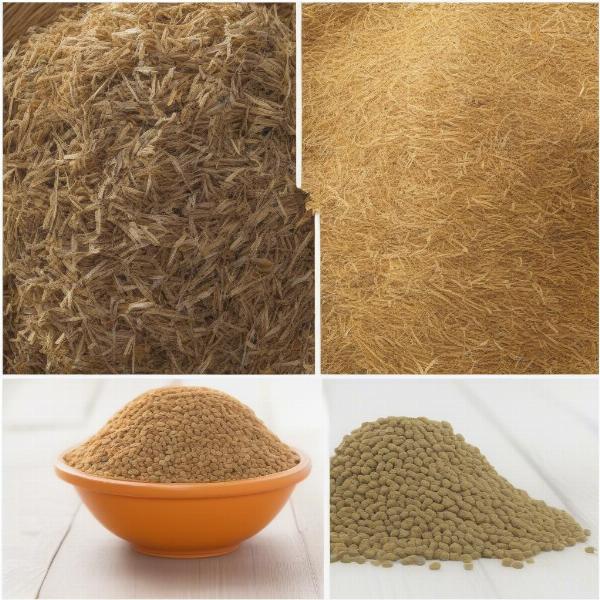Dog food and horse feed are formulated for very different dietary needs. While a nibble of dog food likely won’t harm a horse, consistent consumption can lead to serious health issues. Understanding why dog food is unsuitable for horses is crucial for responsible pet ownership and ensuring the well-being of your equine companion. This article will delve into the potential consequences of horses eating dog food and explain the key differences between equine and canine nutrition.
Horses are herbivores, their digestive systems designed to process high-fiber diets consisting primarily of grass, hay, and grains. Dog food, on the other hand, is designed for carnivores/omnivores and is high in protein and fat, derived from animal sources. These differences in nutritional composition are at the heart of the problem.
Why Dog Food is Bad for Horses
A horse’s digestive system isn’t equipped to handle the high protein and fat content found in dog food. This can lead to a variety of problems, from mild digestive upset to severe colic and even laminitis. Over time, a diet rich in dog food can cause nutritional imbalances, leading to deficiencies in essential vitamins and minerals that horses require. The wrong balance of calcium and phosphorus, for instance, can contribute to developmental orthopedic disease (DOD) in young horses and other skeletal problems.
Digestive Upset and Colic
Dog food can disrupt the delicate balance of microbes in a horse’s hindgut, leading to gas production, diarrhea, and potentially life-threatening colic. Colic is a broad term for abdominal pain and can have various causes, but dietary changes and inappropriate feed are common culprits. The high fat content in dog food can also contribute to colic.
Laminitis Risk
Perhaps the most serious concern associated with horses eating dog food is the increased risk of laminitis. Laminitis is a painful inflammatory condition affecting the sensitive laminae within the hoof. It can be triggered by various factors, including dietary imbalances, and can have devastating consequences, potentially leading to chronic lameness or even euthanasia. The high starch and sugar content often found in dog food, even grain-free varieties, can contribute to laminitis development.
Nutritional Deficiencies
While dog food may seem nutrient-rich, it doesn’t provide the specific vitamins and minerals that horses need in the correct proportions. Horses require a carefully balanced diet to ensure they receive adequate amounts of fiber, vitamins, and minerals like calcium, phosphorus, and selenium. Long-term consumption of dog food can create deficiencies that negatively impact a horse’s overall health, including coat condition, hoof growth, and immune function.
 Horse Hay vs. Dog Food
Horse Hay vs. Dog Food
What To Do If Your Horse Eats Dog Food
If your horse has consumed a small amount of dog food, it’s likely not a cause for immediate panic. Monitor your horse closely for any signs of digestive upset, such as changes in manure consistency, loss of appetite, or signs of abdominal discomfort. If you notice any unusual behavior or symptoms, contact your veterinarian immediately.
Preventing Accidental Ingestion
Preventing horses from accessing dog food is crucial. Store dog food securely in sealed containers and out of reach of horses. If you feed your dog outside, ensure the area is inaccessible to horses. Be mindful of leaving dog food bowls unattended, as even a curious nibble can have unintended consequences.
Dr. Emily Carter, DVM, Equine Specialist, advises, “Preventing access is the best approach. Horses are naturally curious and may investigate anything that smells interesting. Secure storage and responsible feeding practices are essential.”
Conclusion
While a small amount of dog food is unlikely to cause significant harm, regular consumption can pose serious health risks to horses. Understanding the fundamental differences between equine and canine nutrition is crucial for responsible horse ownership. By taking preventative measures and prioritizing a balanced equine diet, you can ensure your horse’s health and well-being. Remember, prevention is always better than cure.
FAQ
- Can horses eat any type of dog food? No, all types of dog food, including grain-free varieties, are unsuitable for horses due to their high protein and fat content.
- What are the signs of colic in a horse? Signs of colic include pawing the ground, rolling, flank watching, sweating, and decreased manure production.
- How much dog food can a horse eat before it becomes harmful? Even small amounts consumed regularly can contribute to long-term health issues.
- What should I feed my horse instead of dog food? Horses thrive on a diet of high-quality hay, fresh grass, and a balanced grain ration formulated specifically for equines.
- What should I do if I suspect my horse has laminitis? Contact your veterinarian immediately. Early intervention is critical for managing laminitis.
ILM Dog is your go-to resource for expert advice on all aspects of dog care and well-being, specializing in breed selection, health and medical care, training, nutrition, grooming, and product recommendations. We provide practical, reliable information for dog owners of all experience levels. For expert advice tailored to your dog’s needs, contact us at [email protected] or call us at +44 20-3965-8624. Visit ILM Dog for more valuable insights into dog care and discover the perfect products for your furry companion.